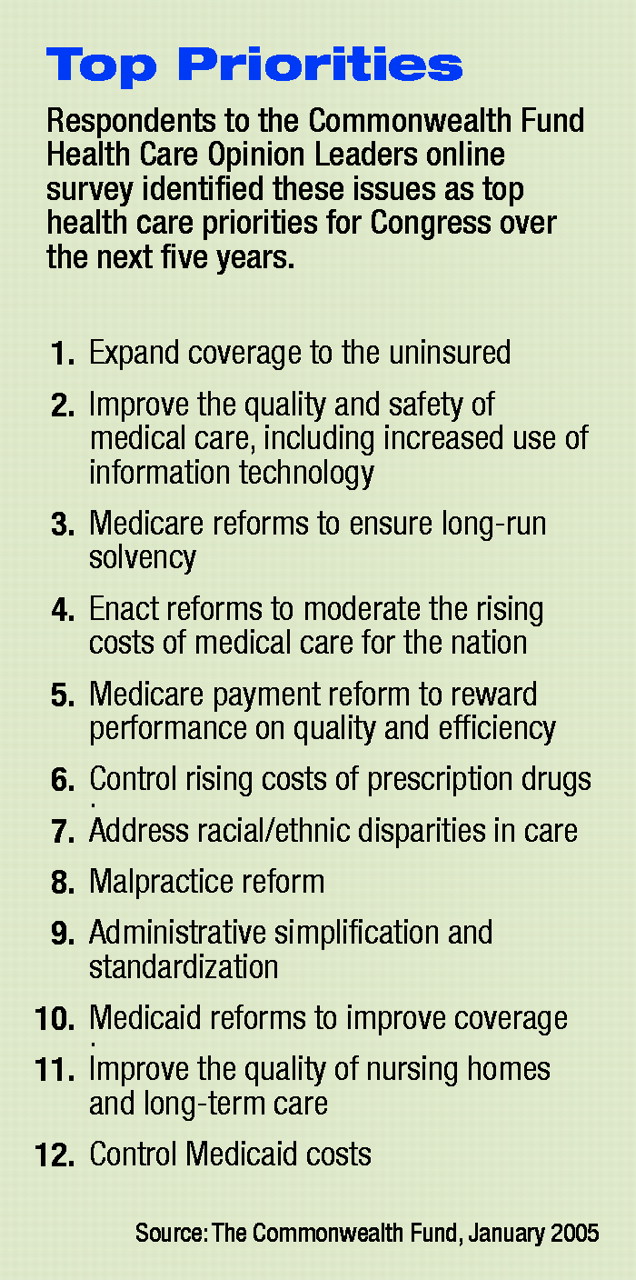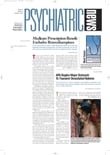Covering the uninsured should be Congress's top health care priority over the next five years, according to an online survey of opinion leaders in health care delivery, the health care industry, and health care policymaking.
Eighty-seven percent of those responding to a Health Care Opinion Leaders survey by the Commonwealth Fund said that Congress's most urgent priority should be to provide coverage for the uninsured.
Other top priorities include improving quality and safety of care (69 percent), especially through increased use of information technology, and reforms to ensure Medicare's long-run solvency (50 percent).
Opinion leaders were nominated by their peers and included experts from four broad health care sectors: academia and research; health care delivery; business, insurance, and other health industry; and government and advocacy groups. Elected officials and media representatives were excluded.
The online survey, the first in a series conducted by Harris Interactive for the Commonwealth Fund, was delivered by email to a panel of 1,155 experts of whom 318 responded. According to its Web site, the Commonwealth Fund is a private foundation that supports independent research on health and social issues and makes grants to improve health care practice and policy. It was established in 1918 by Anna Harkness, the widower of a succesful businessman and early partner in Standard Oil.
The survey revealed substantial agreement on the specific reforms that might be undertaken to achieve greater access for the uninsured. Allowing individuals and small businesses to buy into the Federal Employees Health Benefits Program (FEHBP) or a similar federal group option received the highest support overall and a majority of votes across all categories of surveyed individuals.
Expanding existing state-based public insurance programs such as Medicaid and the State Children's Health Insurance Programs was also supported by more than half of the opinion leaders overall and across all categories except for the health care delivery sector.
Establishing a single-payer plan through a new program or Medicare was rated a priority by 45 percent of the total respondents, but just 29 percent in the business/insurance sector. Less than one-fourth of respondents said expanding health savings accounts and tax credits for the uninsured to buy individual insurance should be considered priorities.
Respondents in all sectors ranked “pay-for-performance” methods, such as rewarding efficient providers and effective disease management, and increased use of information technology as either the first or second priority for controlling health care costs and improving quality.
Negotiating lower drug prices was called the most important next step for Medicare reform. Sixty-six percent of those in the business and insurance sector and 80 percent in the government/labor and consumer-advocacy sector agreed that allowing Medicare to use its purchasing power to negotiate lower drug prices was a priority for Medicare reform.
“It is not surprising that the survey reveals broad consensus about expanding coverage to the uninsured,” said Gail Wilensky, Ph.D., a senior fellow at Project Hope and past administrator of the Medicare and Medicaid programs during the administration of President George H.W. Bush.“ It is encouraging that there is substantial agreement that coverage expansion might allow individuals and small business to buy into the FEHBP. This is also an idea that need not cost the federal government new monies, and one that both Democrats and Republicans have championed over the years.”
But Wilensky said it remains unclear how this would be implemented.“ Do we mean literally buying into FEHBP or a plan that contains benefit packages that look like what federal employees have available to them? Would the cost of such benefits be reasonable and affordable? These and other issues must be addressed if this approach is to become a viable policy option, but exploring this notion further makes sense.
“Expanding state-based insurance, another area ranked as a high priority by survey respondents, is more ambiguous, since support for this idea is likely to depend on the answers to the question of who should be covered by such expansions and under what terms,” Wilensky said. “Policymaker support for extending state-based coverage for those under 150 percent of the federal poverty line, for example, is likely to differ greatly from support for those who have substantially higher incomes—say, 300 percent or 400 percent of the poverty line.”
Wilensky noted that while the 28 percent response rate was not necessarily bad for an online survey, responders may not be representative of the entire sample. And she took a swipe at survey respondents' apparent lack of interest in refundable tax credits and health savings accounts—policy initiatives that have been especially championed by President Bush and other conservatives.
“Dismissing (and “dissing”) refundable tax credits, health savings accounts, and association health plans, without any attempt to gauge the demonstrated effects of these approaches is unhelpful,” she said.
Wilensky's comments and the survey are posted online at<www.cmwf.org/surveys/surveys_show.htm?doc_id=254281>.▪

